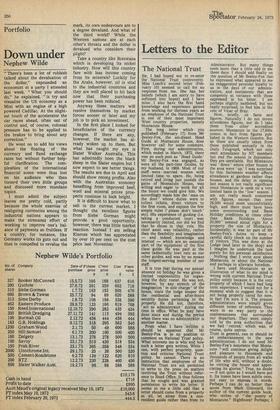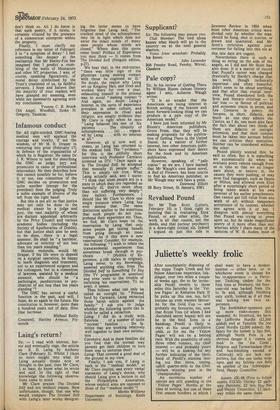Letters to the Editor
The National Trust
Sir, I had hoped not to re-enter the National Trust controversy.
Miss Leach's second letter (February 10) seemed to call for no response from me. She has her beliefs (which I am sorry to have softened into hopes) and I have mine. I also have the first hand knowledge and experience gained from working for thirteen years as an employee of the National Trust in one of their most important West country properties, namely Montacute House.
The long letter which you published (February 17) from Mr 13eeley-Fox, the soi-disant Head Guide at Montacute House, does however call for some comment.
First, during our administration, which ended in March, 1972, there was no such post as ' Head Guide.'
Mr Beeley-Fox was engaged, as were all the part-time Guides, by my husband, in 1968. Most of our staff were married women with limited time to spare. He, being retired and living just outside the gates of Montacute House, was willing and eager to work for all the hours we could give him. We accordingly made him the 'man on the door' whose duties were to collect tickets, direct visitors to the first room, and explain the few simple rules (' please don't touch ' etc). His experience of guiding (i.e.
taking a conducted tour) was necessarily limited, nor did we find that he shone in that role. His chief asset was reliability, rather than the flexibility and imagination — and indeed knowledge and interest — which are an essential part of the equipment of the first class guide. He was paid at the same (admittedly low) rate as our other guides, and was by no means the longest-serving member of our staff.
It is true that during our annual absence on holiday he was given a limited responsibility for organ ising the duty roster. He was not, however, by any stretch of the Imagination 'in sole charge' of the house, since the lodge keeper did the residential and after-hours security duties pertaining to the property. He did not, therefore, 'act as administrator' during our time in office. What he may have done since and during the period when there was no administrator is another matter.
From what I have written it should be apparent that Mr Beeley-Fox Is in no position to comment on National Trust policy. What interests me is why and how such a letter gets written. While I can, with perfect propriety, question and criticise National Trust policy, he cannot. There is an instruction that employees of the National Trust are not permitted to write to the press on matters involving the Trust without reference to Head Office. It thus follows that he sought and was granted permission to write his letter. It seems to me a little odd that a letter should come from a property at all, let alone from a nonresident guide rather than from its Administrator. But many things seem more than a little odd to me these days. I should add finally on the question of Mr Beeley-Fox that he expressed what appeared to me an exaggerated personal loyalty to us in the days of our administration, and sentiments that are competely at variance with those expressed in his letter. I am perhaps slightly saddened, but not really surprised, to find him in the role of Vicar of Bray.
Now, briefly, on facts and figures. Naturally I do not invent attendance figures, nor do I take them from other accredited sources. Montacute in the 17,000s comes in fact from figures published in the Western Gazette. But as these are usually taken from those published annually in the Daily Telegraph, which not only omit attendance by NT members but end the season in September, they are unreliable. But Montacute was ' down ' where other houses in the area were ' up.' I was surprised by this. Inclement weather affects attendance at gardens rather than houses, and the delay in opening last season is not really significant since Montacute is open on a very limited basis in the 'low ' season. I am not really much concerned with figures, except that over 26,000 would seem uncomfortably high, and there must have been some overcrowding and Bank Holiday conditions at times other than Bank Holidays. 'About 20,000' seemed about right for a property the size of Montacute. Incidentally, it was no part of Mr Beeley-Fox's duties to keep a careful daily check on the number of visitors. This was done at the Lodge (and later in the shop) and I imagine he undertook the task purely for his personal satisfaction
Nothing that I write now about Montacute, or about the National and perhaps to alleviate boredom. I have used Montacute as an illustration of what to my mind is wrong with current National Trust policy solely because it is the only property of which I have had long term experience. I would not for a moment wish to suggest that it is not being properly cared for now, in fact I'm sure it is. The present administrators were simply given different terms of reference, They were in no way party to the unpleasantness that surrounded our departure. They were simply told by the area authorities that we had 'retired,' which was, of course, quite untrue.
Trust in general, can or should be an embarrassment to the new administration. I do not need Mr Beeley-Fox's assurance that Monta cute "will continue giving delight and pleasure to thousands and thousands of people from all walks of life who will, without a doubt, be visiting the house and appreciating its glories." True, no doubt — if not quite as I would have put
it. Its losses have been subtle ones, not easy to express in words. Perhaps I can do no better than quote from Mark Ginouard, the author of the current guide book, who writes of "the poetry of Montacute." Highflown? Perhaps; I
don't think so. All I do know is that such poetry, if it exists, is certainly vitiated by the presence of a commerical enterprise within the property. Finally, I must clarify my reference in my letter of February 3 to "a symptom of decay." I feel something like despair at the realisation that Mr Beeley-Fox has imagined that I predict a crumbling of the walls of Montacute and other NT properties. I was, of course, speaking figuratively, of moral decay symbolised by the Trust's treatment of us, its faithful servants. I hope and believe that the majority of your readers will have grasped my meaning, even while not necessarily agreeing with my conclusions.
Yvonne C. R. Brock Old Angel, Woodhill, Stoke St Gregory, Taunton.



































 Previous page
Previous page